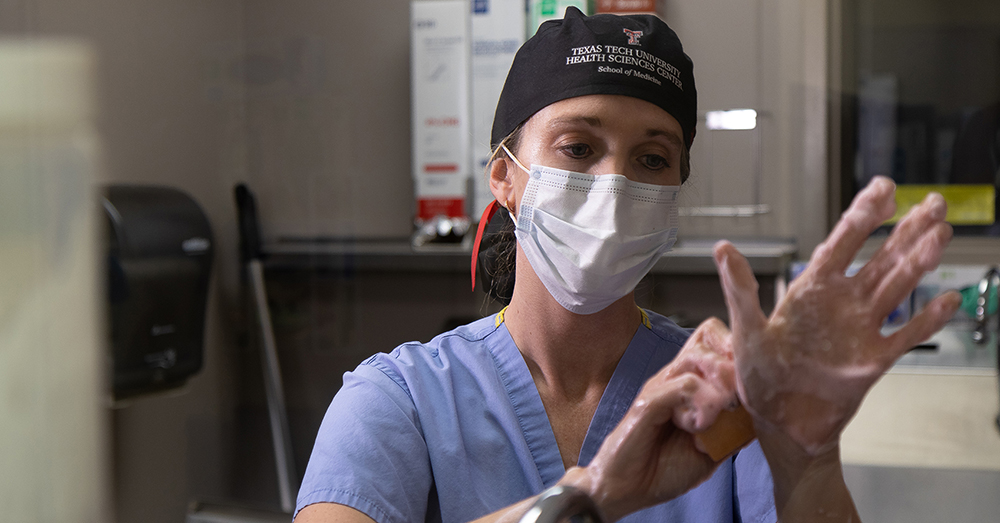Equip Yourself with Lifesaving Skills – Know How to Stop the Bleed During National Stop the Bleed Month

Brittany Bankhead, M.D.
The recent back-to-back mass shootings in the United States has focused a lot of attention on how to reduce the number of lives lost in each of these tragic events. When a traumatic event occurs, bystanders often are the first to step up as they wait for emergency medical services (EMS). Uncontrolled bleeding is the No. 1 cause of preventable death from trauma. This includes unexpected penetrating injuries such as gunshot and stab wounds, but it also includes blunt injuries such as motor vehicle accidents, boating accidents and falls.
According to the National Trauma Institute, excessive bleeding is responsible for nearly 35% of pre-hospital deaths and 40% of deaths during the first 24 hours of a traumatic event.
Brittany Bankhead, M.D., an assistant professor of surgery for the Division of Trauma, Burns and Critical Care at the Texas Tech University Health Sciences Center, said this life-threatening bleeding can happen in everyday scenarios.
“While your local trauma center has the equipment and team necessary to best control this bleeding, there is one thing that we cannot control – time,” Bankhead said. “The ability of a bystander, to know what to do in the event of a bleeding emergency can give EMS enough time to arrive and bring the patient to us.”
May is National Stop the Bleed Month and Bankhead said this is an opportunity to learn the basic skills necessary to control bleeding from accidents and injuries.
Most Stop the Bleed courses last no more than 90 minutes. Participants will listen to a formal presentation which is followed by hands-on practice of applying direct pressure, packing a wound, and using a tourniquet to stop bleeding. After completing the course, students will receive a Stop the Bleed course completion certificate.
“Stop the Bleed is a campaign aimed at helping everyday people learn how to stop bleeding in order to save a life,” Bankhead said. “Currently, 1.9 million people have been trained, and you and your family, loved ones, friends and work groups can be among the next group to develop this set of important skills. Having this knowledge and set of skills is just as important as knowing CPR for the general public.”
The key steps of Stop the Bleed include:
- Ensure your own safety. It’s impossible to help others unless you have removed yourself from harm’s way. In an active shooter situation, this means being away from any possible further danger; in a roadside car accident, this could mean a safe distance from ongoing traffic.
- Look for life-threatening bleeding. A slow ooze can wait, but recognizing what may kill someone in minutes (especially when multiple people are hurt) is essential.
- Use what is available to you (tourniquet, clean gauze, or maybe just a clean cloth nearby) to apply pressure or tighten by the wound, depending on where the wound is located.
“Once you are Stop-the-Bleed certified, keep a tourniquet in your home and vehicle, or in your purse or backpack, which is the best way to stay prepared,” Bankhead said. “Keeping a supply of QuikClot Clotting Gauze is a great addition to any home first aid kit. Knowing how to properly stop bleeding and apply and tie a tourniquet does not only save a life, but also save the functional outcome of that arm or leg long-term and place a tourniquet.”
If you are interested in attending a Stop the Bleed course or learning more, please visit stopthebleed.org. The American College of Surgeons now offers an online interactive course, or you can contact the University Medical Center EMS at (806)775-8725 for any local Stop the Bleed training opportunities.
Related Stories
The John Wayne Cancer Foundation Surgical Oncology Fellowship Program at Texas Tech University Health Sciences Center Announced
TTUHSC is collaborating with the John Wayne Cancer Foundation and has established the Big Cure Endowment, which supports the university’s efforts to reduce cancer incidence and increase survivability of people in rural and underserved areas.
Making Mental Health a Priority in the New Year
Sarah Mallard Wakefield, M.D., a psychiatrist with Texas Tech Physicians, talks about strategies to combat widespread and growing anxiety.
TTUHSC Dean to be Inducted into the National Academies of Practice as Distinguished Fellow
Gerard E. Carrino, Ph.D., MPH, dean of the TTUHSC Julia Jones Matthews School of Population and Public Health, will be inducted into the National Academies of Practice (NAP) as a Distinguished Fellow of the Public Health Academy.
Recent Stories
The John Wayne Cancer Foundation Surgical Oncology Fellowship Program at Texas Tech University Health Sciences Center Announced
TTUHSC is collaborating with the John Wayne Cancer Foundation and has established the Big Cure Endowment, which supports the university’s efforts to reduce cancer incidence and increase survivability of people in rural and underserved areas.
TTUHSC Receives $1 Million Gift from Amarillo National Bank to Expand and Enhance Pediatric Care in the Panhandle
TTUHSC School of Medicine leaders accepted a $1 million philanthropic gift from Amarillo National Bank on Tuesday (Feb. 10), marking a transformational investment in pediatric care for the Texas Panhandle.
Texas Tech University Health Sciences Center Permian Basin Announces Pediatric Residency Program Gift
TTUHSC Permian Basin, along with the Permian Strategic Partnership and the Scharbauer Foundation, Feb. 5 announced a gift that will fund a new pediatric residency.
